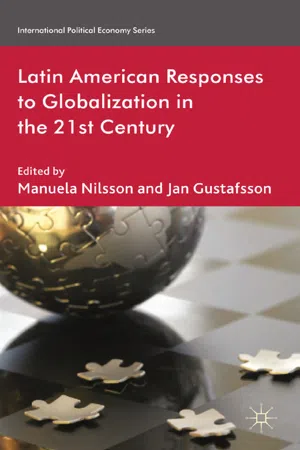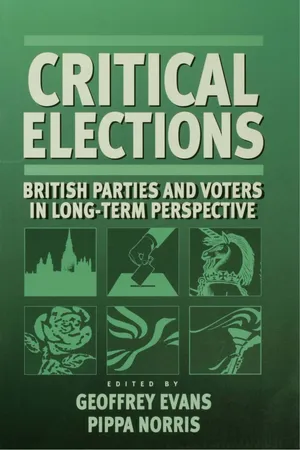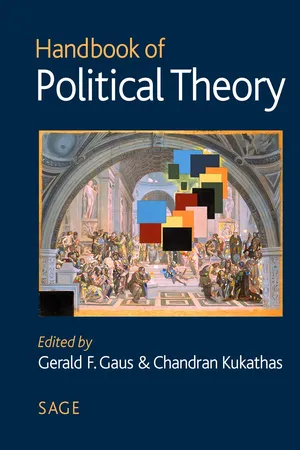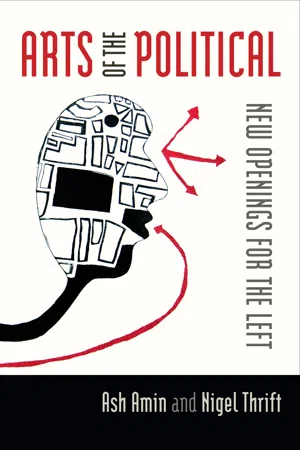Politics & International Relations
Leftist Ideology
Leftist ideology is a political belief system that emphasizes social equality, collective ownership of resources, and government intervention to address economic and social disparities. Leftists typically advocate for policies that prioritize the needs of marginalized groups, support progressive taxation, and promote social welfare programs. This ideology is often associated with movements such as socialism, communism, and social democracy.
Written by Perlego with AI-assistance
Related key terms
1 of 5
7 Key excerpts on "Leftist Ideology"
- M. Nilsson, J. Gustafsson, M. Nilsson, J. Gustafsson(Authors)
- 2012(Publication Date)
- Palgrave Macmillan(Publisher)
84 Formation of the Political Left encompass distinct attitudes toward democracy and socioeconomic reforms and, thus, toward political and economic globalization (see Roberts, 1998; Castañeda, 1993; Walker, 2008; Castañeda and Morales, 2008). The two categories used here are the radical left and the social- democratic left. According to Arditi (2008), these categories have been constructed as the left has manifested itself in different cases through party programs, speeches, or in other actions or policies either while in government or in opposition. The first is the radical left, a broad category that in all cases challenges the global trend of liberal democracy, social injustice, and the hegemony of neoliberal economic policies. Instead, as table 4.2 shows us, it struggles for state intervention in the economic sector, social reforms, and the redistribution of wealth to the masses. Today, this radical new left is represented by the left-wing parties in Nicaragua, El Salvador, Guatemala, Mexico, Venezuela, Ecuador, Bolivia, and Brazil, though the Left in power in Brazil, for example, has followed the third way, that is, social-democracy or left-center policies. In terms of socio- economic policies and state intervention it has similarities with, for example, Allende’s presidency in Chile (1970–3) as well as with tra- ditional European social democracy. The radical left comes in at least three different versions. The first is the populist version, where the radi- cal left will quite often proclaim drastic socioeconomic reforms and the redistribution of land, which are attractive to the masses but generally considered unrealistic by others. It also challenges the domination of the international and economic elites (see March, 2007; Walker, 2008). According to Walker (2008), the resurgence of this popular left largely hinges on the collapse of the old political institutions as well as on new social demands from young people, workers, and indigenous people.- eBook - PDF
- Barbara Goodwin(Author)
- 2014(Publication Date)
- Wiley(Publisher)
Internationalism is the highest ideal of socialist ideology, with its demand for worldwide equality and peace, yet the strength of nationalism and the fierce competitiveness of globalized capitalism – not to mention people’s myo- pia where remote countries are concerned – make it the hardest ideal to pursue in practice. These ideas constitute the ‘common core’ of socialism. Not all socialists subscribe to all of them. But anyone searching for an essentialist definition of socialism should, I think, take the notion of equality as the determining moral force on which other elements of the ideology rest. The presentation of the eleven key ideas here is intended to illustrate the logical connections between them and the way in which policies derive from philosophical assumptions, so as to demonstrate the force and coherence of the socialist ideal. These interconnections are set out schematically in the diagram below. essentialism, essentialist an epistemological approach which holds that objects, people, institutions, etc. have an immutable essence and are not constituted merely by accidents and contingencies Human creativity Human sociability Egalitarianism Cooperation Freedom qua fulfilment Internationalism Diagnosis of root cause of poverty and oppression as inequality Unalienated work Common ownership Popular sovereignty Cooperative organization Philosophical Ideas Political Means THE CHANGING FACE OF SOCIALISM 117 THE CHANGING FACE OF SOCIALISM In the West today (except in the United States), social-democratic parties provide the major opposition to liberal and conservative parties and often form governments. While their parliamentary role has been developing, socialist politicians, political commentators and academics have written countless volumes on the principles and practice of socialism; much of what is written is ephemeral, but some of it adds to the understanding of the meaning of socialism in contemporary contexts. - Peter Joyce(Author)
- 2015(Publication Date)
- Teach Yourself(Publisher)
Collectivism emerged in the United Kingdom towards the end of the nineteenth century when various socialist organizations advocated a more vigorous response by the state to social problems, especially poverty, which would entail an enhanced level of government intervention in the economy and some redistribution of resources from the more affluent members of society. Some within the Liberal Party (the ‘new Liberals’) also moved towards advocating activity by both central and local government to improve social conditions. This resulted in legislation in the early twentieth century to benefit the poorer and weaker members of society and ultimately developed into the welfare state.Left-wing political ideologiesCollectivism is traditionally closely identified with socialism, especially those who view state ownership of the means of production (achieved through policies such as nationalization) as the way to achieve a more just society. However, collective action can be organized through social units other than the state (such as communities that possess a wide degree of political autonomy) and may underpin economic ventures such as co-operatives in which people can work together and pursue common aims within a capitalist economic system.Key idea (4) The left of the political spectrum embraces a wide range of political ideologies, including anarchism, communism and socialism. All seek to promote fundamental social change based upon the redistribution of wealth and resources which typically entails the destruction of the existing social order through revolution.ANARCHISMA number of political ideologies are identified as being on the left of the political spectrum. These seek the destruction of capitalism and the establishment of a new social order based upon a fundamental redistribution of wealth, resources and power.Anarchism literally means ‘no rule’ and is a form of socialism which rejects conventional forms of government on the basis that it imposes restraints on individuals without their express consent having been given. Accordingly, anarchists urge the abolition of the state and all forms of political authority, especially the machinery of law and order (which they view as the basis of oppression, providing for the exercise of power by some members of society over others). Most anarchists deem violence as the necessary means to tear down the state.Anarchists assert that government is an unnecessary evil since social order will develop naturally. Co-operation will be founded upon the self-interest of individuals and regulated by their common sense and willingness to resolve problems rationally. They assert that traditional forms of government, far from promoting harmony, are the root cause of social conflict. Private ownership of property, which is a key aspect of capitalist society, is regarded as a major source of this friction.- eBook - PDF
Political and Civic Leadership
A Reference Handbook
- Richard A. Couto(Author)
- 2010(Publication Date)
- SAGE Publications, Inc(Publisher)
Traditionally, left political and social theorists have made a strong distinction between radical politics aimed at transforming capitalism and liberal politics aimed at achieving gains within the parameters of the existing sys-tem. This distinction is still meaningful, but as we shall see, it is not, upon closer inspection, entirely clear-cut. Indeed, an interesting feature of recent social thought is the growing convergence between more radical, left tradi-tions and liberal and civic republican political theories. Marxists and post-Marxists such as G. A. Cohen have largely abandoned traditional Marxist conceptions of social change and have acknowledged the centrality of the idea of justice (a term often derided by Karl Marx) and normative values more generally in advancing a positive ideal of a better society (G. A. Cohen, 2000, 2009). Other left theorists frame their critiques of contemporary capi-talism in terms of the requirements of democracy: Such analysts characteristically claim that the integrity of democratic politics is threatened or constrained by the inequalities of power characteristic of modern capitalism— including not only inequalities between citizens but also the disproportionate political influence of corporate interests, resulting from both direct lobbying activities and the capacity of capital to block or disrupt progressive economic policies by withholding investment (J. Cohen, 1989). Left democratic theorists typically want, in effect, to use democratic politics to reshape or restructure back-ground social and economic arrangements so as to enhance the integrity of democratic politics and to expand the substance of political equality. 12 P OLITICAL T RADITIONS Left Political Movements and the Politics of Social Justice T HAD W ILLIAMSON University of Richmond 97 - eBook - PDF
Critical Elections
British Parties and Voters in Long-term Perspective
- Geoffrey Evans, Pippa Norris, Geoffrey Evans, Pippa Norris(Authors)
- 1999(Publication Date)
- SAGE Publications Ltd(Publisher)
PART III N EW ISSUE ALIGNMENTS? 1 0 The Impact of Left-Righ t Ideology David Sanders For much of the twentieth century, the left-right ideological cleavage has played an important role in the electoral politics of most democratic countries. The precise meanings of 'left ' and 'right ' have obviously varied both over time and with geographical context. At their root, however, is the notion that the left favours collectivist solutions to the problem of economic distribution whereas the right favours a more individualistic approach. In Britain, at least until recently, the Labour Party was tradi-tionally regarded, by its members and by voters, as the main bastion of the collectivist approach to public policy. It advocated an active role for the state in production, distribution and exchange. It favoured a system of progressive taxation that raised sufficient government revenues to provide a 'cradle to the grave' welfare state. And it was generally supportive of working-class trade unionism and suspicious of the aims and activities of big business. The Conservative Party, in contrast, represented the interests of 'business ', of private enterprise and of fiscal rectitude. It was, for the most part, antipathetic to nationalized industries and distrustful of the growth of the welfare state -even if pragmatic consid-erations obliged it for much of the postwar period to accept them both. For many observers, the ideological basis of British politics began to change during the 1980s (Butler and Kavanagh 1992; Crewe 1992). Thatcherism represented a conscious attempt by Conservatives to 'roll back the frontiers of the state'. By reducing state involvement in industry and commerce, and by cutting back on welfare recipients' reliance on state benefits, private enterprise would be reinvigorated and the long-term fortunes of the British economy (and, by implication, polity) would be restored. - eBook - PDF
- Gerald F Gaus, Chandran Kukathas, Gerald F Gaus, Chandran Kukathas(Authors)
- 2004(Publication Date)
- SAGE Publications Ltd(Publisher)
While liberal political philosophers instruct us to revise individ-ual life plans but remain committed to the constant values of liberty, human rights and human progress, Ideology, Political Theory and Political Philosophy 9 students of ideology demand revised assessments of the frameworks and constraints that propel groups into preferring one combination of ideas to another. However, to endeavour to account for the features, sources and outcomes of political ideologies is by no means an endorsement of all their manifesta-tions; it does not promote a relativism in which ‘anything goes’. Indeed, local forms of thinking may share some features with each other in a kind of contingent universalism that acts as a cultural constraint on what societies may legitimately do. Political idea systems are a product of interacting, even overlapping, human minds, and also exist within differentiated geographical, historical and cultural spaces. The comparative study of ideolo-gies has to address these problems of translation, when differences are often masked by ostensible similarities of language, while similarities are dis-guised by disparate ways of expression. IS PHILOSOPHY LIBERAL PHILOSOPHY, OR EVEN LIBERAL IDEOLOGY? The parallel to philosophical misgivings about ideo-logies, and their study, is a continuous attempt by students of ideology to reduce Western political philosophy, especially in recent decades, to the one ideological dimension of liberalism. Analysts of ideology point out that the story of contemporary philosophy is tantamount to that of liberalism itself, and that political philosophy in the twenty-first century has become incapable of absorbing, and react-ing to, a broader spectrum of extra-liberal political thinking. - eBook - PDF
Arts of the Political
New Openings for the Left
- Nigel Thrift, Ash Amin(Authors)
- 2013(Publication Date)
- Duke University Press Books(Publisher)
The analytical clarity of the contemporary anti-capitalist Left is not always matched by the level of practical and propositional competence that might enable it to reach its goals. The task is only made more difficult by the all-encompassing nature of mod-ern capitalism, which means that it is very difficult to locate an outside to the system from which it is possible to build a standpoint. Capitalism Reformed This may explain why much of the Left now stands for a politics of re-form rather than revolution. The reformist Left reasserts the possibility of social democracy, market regulation, and human development through a combination of national and international reform. Its focus falls on constitutional change, responsible government, and pro-development policies, underpinned by a commitment to distributive justice, social cohesion, and cosmopolitan democracy. This Left seeks, in part, to re-instate Keynesian and redistributive principles swept aside by neoliber-alism; in part, to introduce supply-side reforms to unlock human and regional potential; and in part, to institute Third Way compromises be-tween state, market, and civil society in governing economy and society. It also recognizes how globalization—manifest in the rise of world-level processes and institutions and the intensification of international flows chApter 84 4 and interdependencies—has radically altered the meaning and scope of local possibility. Accordingly, it is interested in global reforms that can address issues that escape national control as well as strengthen the hand of national and subnational social democracy. We do not assume that the reformist Left is a single or coherent entity. Significant differences in thought and practice can be found over reform priorities and possibilities; the balance of responsibility between local and transnational actors; the spread of power between markets, state, and civil society; and the model of capitalism that might be desirable in the long term.
Index pages curate the most relevant extracts from our library of academic textbooks. They’ve been created using an in-house natural language model (NLM), each adding context and meaning to key research topics.






